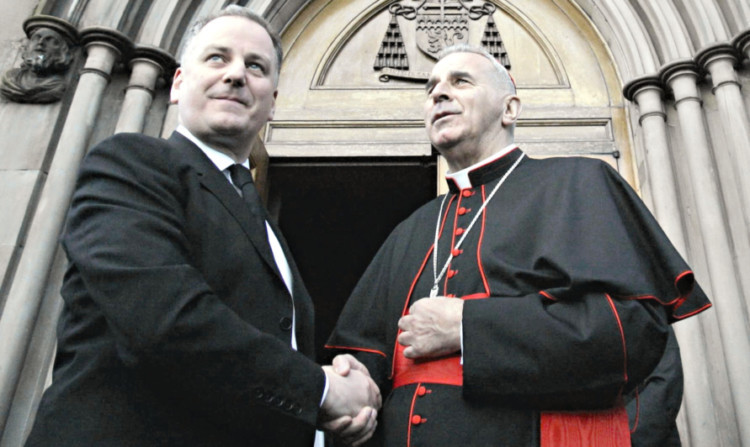
Scots councils are ignoring a pioneering policy to smash sectarianism in classrooms a decade after it was introduced.
A Sunday Post probe reveals more than half of local authorities have failed to open a single shared campus school since the Dalkeith Community Campus replaced St David’s and Dalkeith High in a blaze of publicity 10 years ago.
Shared campus facilities are where non-denominational and Catholic schools are homed on the same site.
While they remain educationally independent, the schools share facilities like dining areas and sports halls.
In a significant policy shift in 2004, First Minister Jack McConnell hoped pupils sharing social spaces would help spell the end to sectarianism once and for all.
But our investigation has discovered 17 out of 32 local authorities have failed to open a single shared facility.
It has led to accusations the scheme has been shelved by the Scottish Government.
While some councils like Aberdeenshire, Orkney and Shetland don’t have faith schools, other authorities who have ignored the shared campus scheme are situated in the deeply divided central belt area.
East Renfrewshire, Falkirk, South Ayrshire and South Lanarkshire all have no shared campus schools, or plans for them in the future.
It was in 2004 that Jack McConnell opened the first of a new wave of shared campus secondary schools in Dalkeith to try and halt Scotland’s “secret sectarian shame”.
The former Maths teacher believed Scottish classrooms were the frontline battleground for sectarianism, where the war could be won.
The high-profile backing of the Dalkeith facility from the First Minister was seen as a major policy shift and was hoped to kick-start a shared campus building spree.
But even before its opening the campus was shrouded in controversy with pupils and staff claiming attending the new-look school meant running a gauntlet of threats and physical intimidation on a daily basis.
It was against this backdrop that the school was opened by McConnell, Cardinal Keith O’Brien and the former moderator of the Church of Scotland Reverend Dr John Cairns.
The problems soon died down but so did it is claimed support from the Catholic Church.
While publicly backing the Dalkeith campus, Church leaders said they never envisaged its use as a model for the future of schools.
Instead, they viewed it as pragmatic compromise which would ensure the survival of a Catholic school in the face of dwindling pupil numbers.
Peter Kearney, spokesman for the Roman Catholic Church in Scotland, said: “Shared arrangements are regarded as the exception to the norm and reserved for situations where pupil numbers wouldn’t justify a stand-alone school.”
Privately, supporters of the shared campus policy believe the poor council take-up is being driven by political dogma.
One insider said: “When the SNP Government took over from Labour they put the brakes on it.
“It was just too controversial.
“There were priests briefing against campus schools from the pulpit. With an independence referendum coming up you can’t risk alienating Scottish Catholics.”
The scheme also suffered at the hands of the recession. The then Scottish Labour Government planned to invest £2 billion modernising the country’s schools by 2009. But those plans were never realised.
Alastair McBay, of the National Secular Society, who want all faith schools scrapped, said: “The scheme has undoubtedly faltered. McConnell’s idealism has not been borne out.
“The difficulty remains some of the main players refuse to believe there’s a sectarian problem in the first place.”
As some councils remain unmoved by the policy others are only now beginning to embrace it.
Last month council chiefs in Inverclyde opened a new £44 million shared campus school in Port Glasgow.
Meanwhile West Dunbartonshire has just approved a new multi-denominational primary school complex.
However shared campuses still represent a tiny fraction of the 2,060 primary schools, 365 secondary schools and 145 special schools in Scotland.
A Scottish Government spokeswoman said it recognises the benefits of shared campuses. And she added that while decisions on school buildings are a matter for individual councils, it encourages them to consider shared campuses.
She said: “We’ve helped fund many of these developments through Scotland’s Schools for the Future programme and will continue to do so.”
By Gordon Blackstock and Janet Boyle

Enjoy the convenience of having The Sunday Post delivered as a digital ePaper straight to your smartphone, tablet or computer.
Subscribe for only £5.49 a month and enjoy all the benefits of the printed paper as a digital replica.
Subscribe